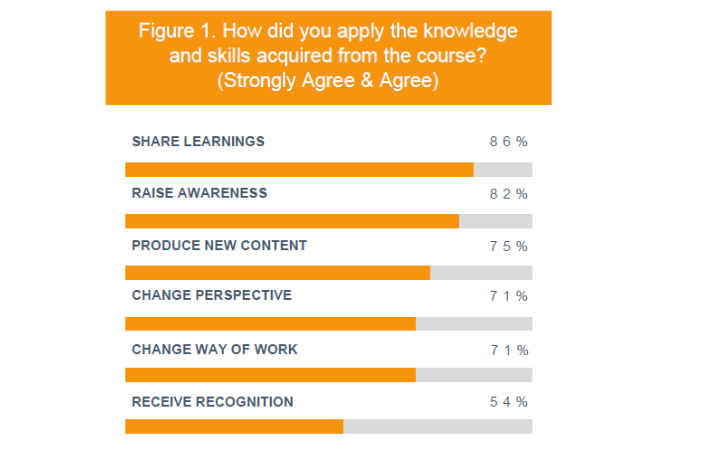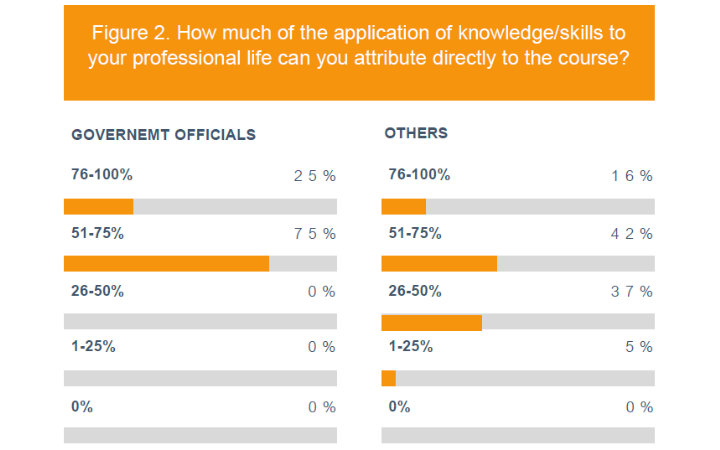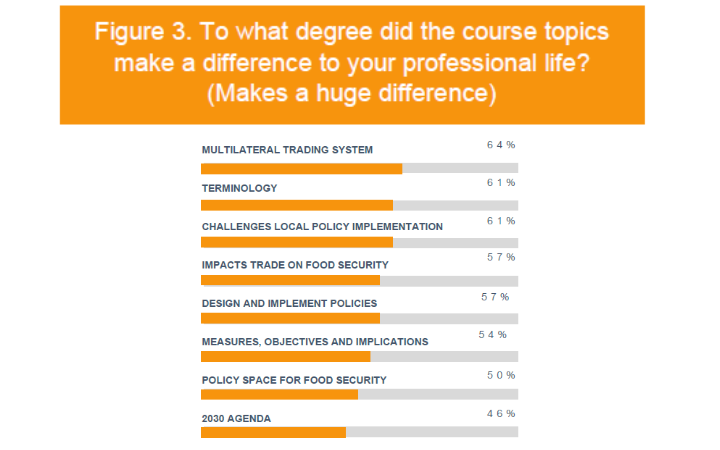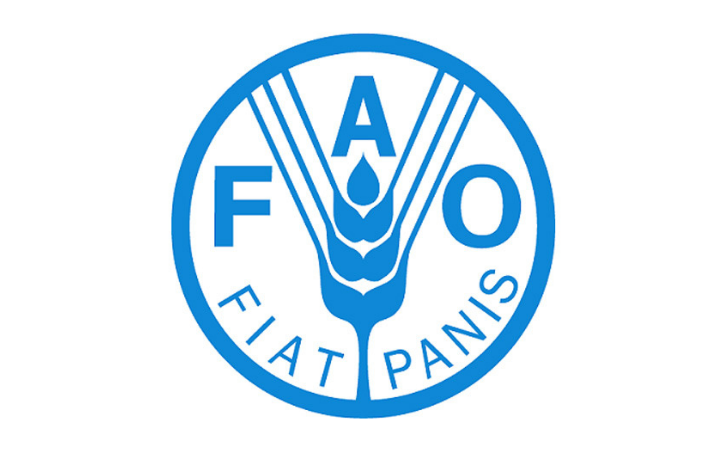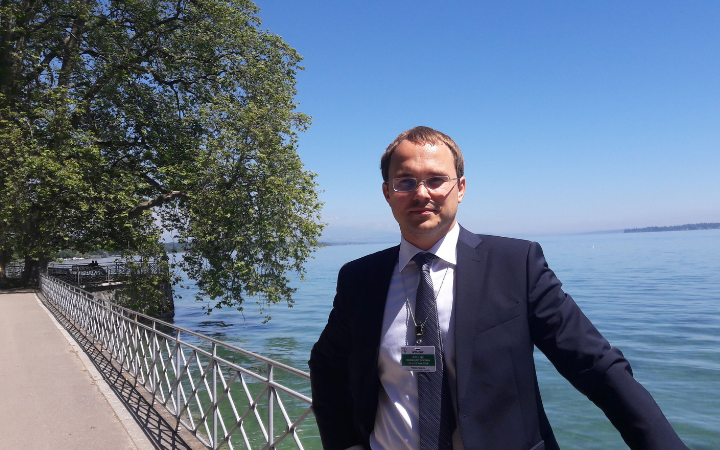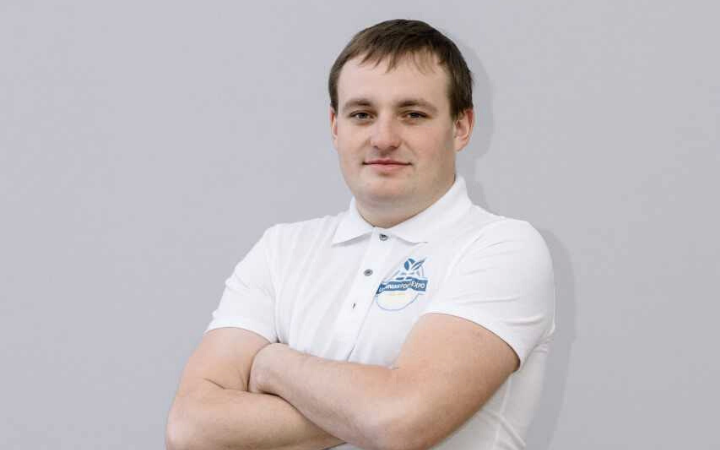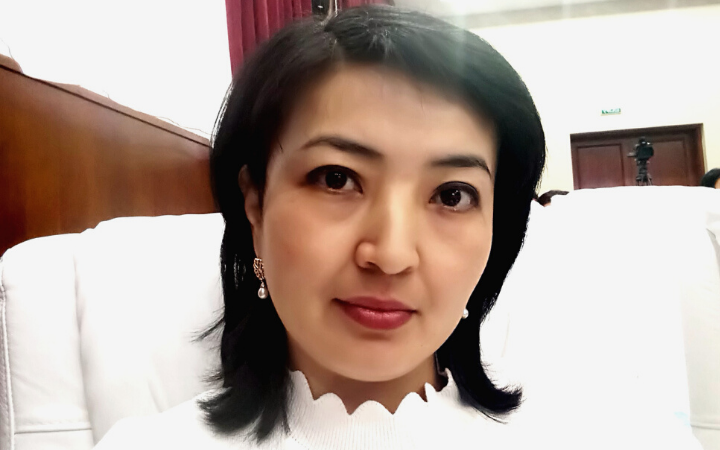Background
The Food and Agriculture Organization of the United Nations (FAO) and the United Nations Institute for Training and Research (UNITAR) organised a joint e-Learning course on “Trade, Food Security and Nutrition” in May and June 2018 for representatives from government and related authorities involved in the formulation and implementation of agricultural policies and programmes in Central Europe and Asia.
The four-week course aimed to strengthen capacities to develop and implement evidence-based trade policies and to formulate and negotiate trade agreements taking into consideration both the needs for economic growth and structural transformation as well as food security and nutrition concerns. The relationship between trade and food security is attracting increased attention on both the trade and development agendas, including in the 2030 Agenda. The challenge is how to ensure that the expansion of agricultural trade works for and not against the Sustainable Development Goals. This challenge has been at the forefront of the negotiations on the changes to the current global agreements on agricultural trade to enhance food security.
The course attracted much interest, with 301 applications received, of which 77 applicants were selected to take part including 49 women. The criteria for selection focused on the role the participants might play in formulating trade policy after the course, and the impact that they would be able to have. Seventy-five participants completed the course (97 per cent completion rate), following four objective assessments and active participation in weekly discussion forums.
For this story, we conducted a survey amongst participants one year after completion to determine how the course may have changed their professional lives. The survey results are enriched by stories collected during in-depth interviews with three participants using the most significant change approach.
Amongst the participants to the survey, 80 per cent enrolled in the course to grow in their current job, while 20 per cent aimedf or a career change. All but one respondent confirmed applying skills and knowledge learned in the course to their professional life over the past year. On-the-job application proved to be more important amongst participants that enrolled to grow in their current job and than amongst academic.
The importance the participants attributed to on-the-job application and confidence to apply the new knowledge and skills were important drivers to, and the frequency of, application.
Overall, 86 per cent of learners strongly agreed or agreed that they shared new knowledge and skills over the past year (Figure 1). The personal stories below confirm this eagerness to spread the new knowledge; all three interviewees talked passionately about how they shared and about their eagerness to continue sharing their new knowledge. Especially participants for whom the on-the-job application is very important to their job success (88 per cent) and academics perform better on sharing learnings (100 per cent) and calling attention to raise awareness (90 per cent). Government officials changed more their perspective (88 per cent) and the way they do certain aspects of their job (75 per cent).
Government officials applied the knowledge and skills slightly less frequently, although all government respondents attributed more than 50 per cent of their on-the-job application to their participation in the course (Figure 2).
Figure 3 illustrates the course topics that made the biggest difference on participants’ professional lives. Participants for whom the on-the-job application was very important valued terminology, design and implementation of policies (76 per cent) more than others and also valued topics of trade within the 2030 Agenda (65 per cent).
The United Nations Institute for Training and Research (UNITAR) and the Food and Agriculture Organization of the United Nations (FAO) has a long-standing collaboration aimed at expanding access to education and training to strengthen capacities of stakeholders, with training activities on a wide range of topics being implemented since 2010.
The partnership builds upon the strengths of both institutions by transforming the knowledge expertise provided by FAO into high-quality learning products and services designed to transfer knowledge, impart skills and raise awareness and takes full advantage of modern information and communication technology (ICT) for greater outreach and cost-effectiveness.
Impact Story - Maksim Golovin
Maksim Golovin
Academic researcher and professionally active in a non-profit agricultural organization in Russia
Empowering students to win competition
Reaching Maksim by phone proved to be somewhat difficult given his busy schedule. When we succeeded to catch him in-between meetings, Maksim turned out to be very enthusiastic. Maksim is a young researcher at Moscow State University in Russia with a thirst for knowledge. He is also professionally active in a non-profit agricultural organization. The subject matter of the FAO-UNITAR course seemed an interesting addition to his research, and previous positive experiences with FAO training convinced him to apply.
Coming from academia, Maksim started the course with some prior knowledge on most topics, but he soon discovered that some of his knowledge was fragmented and superficial and that other parts of his know-how was outdated. He gained a better understanding of international trade within the WTO framework. Thanks to the course, he expressed much more confidence in this field.
In addition to his research, Maksim is also passionate about teaching. At Moscow State University, he teaches a course on economics which focuses in part on international trade and Russia’s membership in the WTO. The institutional legal frameworks that Russia takes part in are very important and therefore should be explained in-depth to his students to make sure these ‘new’ realities will be taken into account for decision making once the students enter their professional lives. According to Maksim some of the proposals being discussed in broad communities could benefit from more information on international trade and Russia’s membership in the WTO. His broadened knowledge base on international trade and its related frameworks is therefore very important to Maksim, and he is eager to share this knowledge with his students. To increase relevance and learning amongst his students, he significantly modified the module on international trade to include many practical examples. Maksim also uses much of the course material to support his own teaching. He especially appreciates how the course offered him material and ways to visually explain difficult concepts to his students. The new course materials clearly help students not only to understand the course topics but also to establish a thorough foundation to build on for other, more specialized courses.
Maksim is especially proud that his students won the yearly competition of young scientists on the topic of food security. This competition is part of a large scientific conference and demands high quality academic work. Of course, he tells us, their winning is his students’ own success, but he is proud he helped them to achieve this distinction.
For his work at the non-profit agricultural organization, Maksim is participating in all activities of his organization related to customs, tariff regulation and trade policies, all activities strongly linked to the WTO framework. He interacts on these topics with the broader public and with state authorities. The course helped him gain importance and standing in this capacity. Maksim feels more appreciated as the person who understands the basic principles of international agricultural trade, and is able to thoughtfully analyze specific issues based on these principles. Even though Russia’s participation to the WTO is a debate topic, Maksim feels that he now reaches more people that also listen to what he has to say. As an example, one of the industry alliances is actively lobbying for withdrawal from the WTO; Maksim’s organization is arguing against withdrawal and, presently, his organization is prevailing in discussions which to him is a big accomplishment. That said, Maksim acknowledges that his influence on actual trade policies is probably limited as decisions are taken at higher levels, he does however contribute to discussions about it.
From his own career point of view, Maksim has experienced constant growth since he participated in the FAO-UNITAR course. Besides all what has been mentioned, he was to his own surprise invited as a speaker at an economic conference in Georgia. This was an amazing experience for him. Maksim feels that the knowledge, skills and confidence he gained by participating in the FAO-UNITAR course are undoubtfully an integral part of his current professional growth and a door opener for new professional experiences.
To conclude, Maksim thinks this FAO-UNITAR course should be more widely available. Not only to make the material easier accessible to his own students, but also for the wider audience. The course increases transparency about international trade and uncovers the interconnectedness of the world today, which is important information that should be shared broadly.
Impact Story - Bohdan Shapoval
Bohdan Shapoval
Head of association of food exporters in Ukraine and Ph.D. student
Applying knowledge and skills on the ground: A domino effect
Bohdan participated in several FAO-UNITAR courses. Like Maksim, Bohdan is combining his professional activity as head of the association of food exporters with Ph.D. research on food marketing of Ukrainian products in the international markets. For both professional activities, it is important for Bohdan to understand the system of international agricultural trade and how trade is linked to food security, how to negotiate trade policies and how private associations, like the one he is leading, can have a real influence in the decision-making process. Ultimately, Bohdan wants to help the association’s members find their way in the international markets.
Bohdan already possessed good, basic knowledge from previous FAO-UNITAR courses. Based on his previous positive experiences, he wanted to continue his learning journey and deepen knowledge on the WTO framework and its impact. More particularly, Bohdan was interested to learn how the business community interacts with the state in different countries and how states interact within the WTO framework. Although Bohdan was the only participant from his organization, he shared all course information and learning material with his professional colleagues. The association, in turn, passed the material to their members which are all local food manufacturing companies.
During our conversation, Bohdan sums up very concrete applications of his organization as a follow-up of the course. Amongst others, his association implemented an e-notification system on Sectoral price fluctuations which turns out to be very useful. He and his colleagues also learned to calculate the Bound tariff for Ukraine on food products and the so-called green and yellow basket measures which they then discussed with the Ministry of Economic Development and Trade. They furthermore discussed and analyzed the impacts of different tariffs on exports from Ukraine in the case of Brexit and the possibilities of a new trade agreement between Ukraine and the UK. For all these analyses Bohdan and his colleagues consulted the course materials on a regular basis. The material was complex, and Bohdan had to re-read it several times in order to understand it and draw the right conclusions. In this process, Bohdan and his colleagues integrated the new knowledge and skills during their on-the-job application.
Bohdan’s association furthermore organizes yearly several trade missions to different countries. Bohdan feels that, thanks to the course, he and his colleagues can now more efficiently schedule more customs duties and calculate better customs tariffs. These help to analyze if Ukraine food exports are suitable for certain foreign markets. In addition, they started incorporating existing trade relations and agreements in their analysis and began to understand how they can use these agreements for promoting Ukrainian food products in international markets.
Bohdan’s interest and research in food marketing of Ukrainian products in international markets led him to attend a summer school in the Leibniz Institute of Agricultural Development in Transition Economies (IAMO), Germany. There he managed to succeed in a moot trade dispute that discussed which country entered the WTO under the best conditions. Based on data presented in the course, Bohdan successfully pleaded that Kazakhstan, and not the Ukraine as believed by many, entered the WTO under the most privileged conditions. Winning this dispute and being able to convince German professors and other academic colleagues on this issue, was the ‘cherry on the cake’ for Bohdan. He considers this event as his biggest personal achievement, an achievement which was a direct output of his participation in the FAO-UNITAR course.
Impact Story - Ayagoz Aitpayeva
Ayagoz Aitpayeva
Civil servant at the Ministry of Agriculture of the Republic of Kazakhstan
Radically changing vision
Ayagoz works as a civil servant for the Ministry of Agriculture of the Republic of Kazakhstan and combines her job with studying. When we spoke with Ayagoz, she was finishing a two-year study for which she is writing a dissertation on food security. Two months later, she planned to l return to her main job at the Ministry.
Ayagoz applied for the FAO-UNITAR course mainly because the content was a perfect match with her field of study and because she was interested to hear the opinions and learn about the visions of international experts and colleagues on trade and food security. This opportunity to exchange opinions and experiences amongst colleagues and experts from different nationalities was very important. She especially appreciated the interactive nature of the course and she valued the fact that the course topics overall were practice-oriented and illustrated with real-life examples.
Ayagoz began the course with a protectionist vision towards food security for Kazakhstan. When choosing the subject of her dissertation, she considered the issue of providing food products on the Kazakh domestic market for import substitution. As a civil servant at the Ministry of Agriculture she was used to viewing food security in isolation and to examine how a possible solution towards food security issues benefits directly the Kazak agricultural sector. Her participation in the course was an eye-opener; she started to realize that complex issues as food security cannot be analyzed nor dealt with in isolation. They are part of a system and therefore require systems thinking, including considering economic and trade aspects. The course radically changed her opinion on agricultural and food security policy making. The topic of global food security became even more relevant to her. In her dissertation Ayagoz now discusses, based on her own experience and learning journey, the problem of a one-sided view on complex and crucial issues like food security. She stresses the need to expand horizons and analyze complex issues from different perspectives and in relation to other policy areas. As such, she radically changed the direction of her discourse.
Ayagoz currently disseminates her new vision by writing articles for academic journals. The course gave her so much new insight and expanded her horizons beyond expectations that she feels a strong call to spread the word. Her participation awakened a strong desire not only to share but also to continue her own learning. Ayagoz plans to participate in conferences, discussions and meetings and would like to continue her academic work in this area, as well as to pass her new knowledge and vision to her colleagues once she will return to her job at the Ministry. After all, her changed vision also changed the way she looks at her job fulfillment. In turn, she hopes to be able to change the Ministry’s approach towards national agriculture and food security.
Conclusion
The impact of this course on the participants can be summed up as personal and professional growth. The impact has not only been on the individuals taking the course, in terms of changing their vision and their attitudes towards the relevant issues, but there is evidence of much wider impact as the stories illustrate how former participants are sharing new knowledge and skills, and multiplying the effects of the training. . And even beyond the individual level, Bohdan’s association, after having received the training material through him, even passed the material to their members which are all local food manufacturing companies. For Maksim, Bohdan and Ayagoz, the course has provided building blocks to greater career success by deepening their knowledge and expanding their horizons. For all three, their increased knowledge led to increased confidence and appreciation by peers and colleaguesAyagoz even drastically changed her vision on international trade and food security. All three former participants are keen to spread the word and actively contribute to a community of knowledge on food security and trade.


